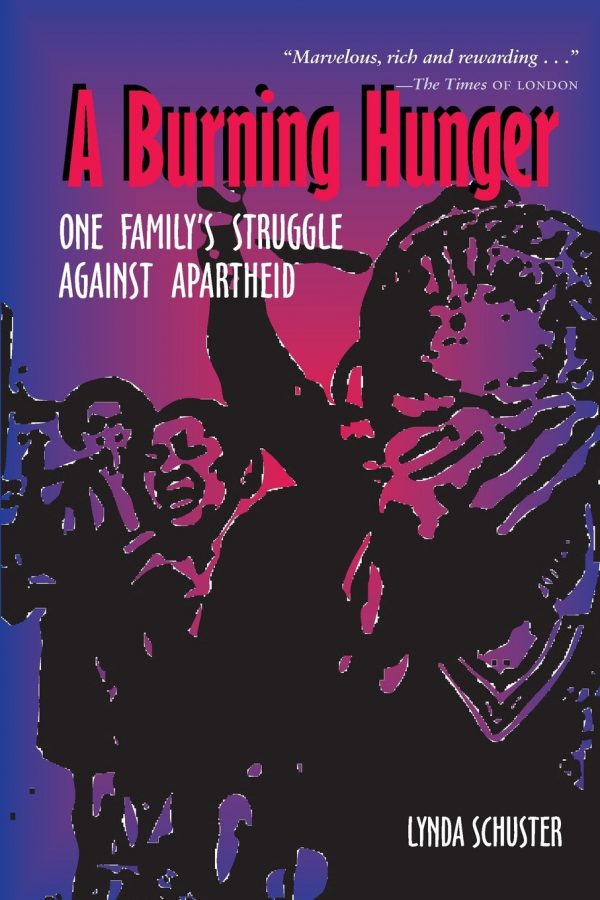On Thursday, September 18, in celebration of Chatham University’s year of Southern Africa, Lynda Schuster, a journalist and author of the book “A Burning Hunger: One Family’s Struggle Against Apartheid,” was invited to speak to students about her book and her experiences reporting about apartheid in South Africa.
The evening began with a brief welcome from Dr. Jean-Jacques Sène, the director of Chatham’s Global Focus Program, followed by a few words from Professor Marc Nieson, a friend of Schuster.
Maggie Pahos, the Global Focus graduate assistant, then came to the podium to formally introduce Schuster, and give a brief background of her accomplishments in journalism.
“What strikes me most about [Schuster’s] work is her sensitivity…to the human experience,” Pahos said. “She brings the stories alive to the reader.”
With that Pahos invited Schuster to the podium, where she was met with a round of applause.
Schuster, who clearly felt very comfortable in front of the approximately 40 people gathered in Chatham’s Welker room, began by casually requesting that the audience bear with her on account of her cold.
She then launched into the story of the events leading up to her writing her book “A Burning Hunger” which chronicles apartheid in South Africa from the point of view of a single family, the Mashininis.
Beginning by explaining what compelled her to write the book in the first place, she talked about what she encountered while reporting from South Africa before apartheid ended. Schuster described apartheid as “the last great morality plague left on Earth…[with] 80% percent of the population, by law, marginalized.”
“Race was everything,” she said, as she recounted a story about a conversation she had with a South African judge, in which the judge described a black defendant as a monkey, rather than a human being.
Noting how journalism is the first draft of history, Schuster explained how she wanted to tell the Mashinini’s story because they were all inexorably linked to the efforts to end apartheid, and therefore, “in telling the their story, [she] would be telling South Africa’s story.”
The Mashinini family consists of parents, Joseph and Nomkhitha, and their 13 children, five of whom are talked about in detail in the book.
Their stories cover everything from being driven from the country and living in exile, to being kidnapped and tortured by the secret police for information, and the book does not shy away from describing the good and the bad sides of each of the family members throughout their fight to end apartheid.
In gathering information for the book, Schuster ran into several difficulties, which she discussed in great detail.
When Schuster first met Nomkhitha in 1988, she was living in fear of the secret police, who were always watching her and her family. That, combined with the fact that three of her sons were in exile, caused Nomkhitha to be very tight lipped about her story.
However, after leaving the country for a few years after the end of apartheid, Schuster “came back to a very different country,” where people were not living in quite as much fear and were free to discuss their stories.
She explained how her process was still difficult because she was asking the family members to recall details about their lives from upwards of 20 years prior so the information was often hard for them to remember.
However, Schuster described one instance in which she discovered, through her hundreds of hours worth of taped interviews with the family, that Nomkhitha had packed one of her sons a tuna fish sandwich before he fled the country. She explained how details like that are “so important” because they make stories more relatable to the reader.
The process of the gathering the information for the book took several trips back and forth to South Africa, hours and hours of research in newspapers and journals, and even flying one of the sons to where she was living in Peru just to finish interviewing him.
The final result was clearly worth the effort, though, which was evidenced when she read two excerpts from the book, one of which was a chilling description of one of the son’s experiences being tortured for information by the secret police.
After the conclusion of her talk, which was met with an enthusiastic round of applause, Schuster took some time to accept questions from the audience, of which there were several about both the Mashinini family and the state of South Africa.
Afterwards, students milled about, chatting about the book and eating the food provided for the event. Renee Seaman, a senior political science major at Chatham, explained that she came to the event based on a professor’s recommendation.
“I didn’t know much about the topic,” she said, “so I was interested in coming.” She went on to say that she thought the talk was extremely interesting, and she liked Schuster’s family oriented approach in the book.
Several other students and faculty echoed her sentiments, and many expressed how glad they were that they came and heard Schuster’s story.


